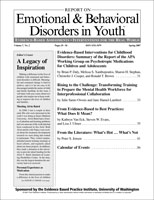Complete issue
Author: Melissa W. George.
Source: Volume 14, Number 02, Spring 2014 , pp.27-50(24)

< previous article |return to table of contents
Abstract:
This issue of the Report on Emotional & Behavioral Disorders in Youth includes three papers that provide educators, mental health professionals, and practitioners with a review of the current evidence base and recommendations for supporting youth contending with emotional and behavioral problems. The first discusses a framework for schools to use in considering the planning and implementation of universal mental health screening within schools; the second presents pilot data for a modified measure intended to assess teachers’ attitudes toward evidence-based practices; and the third highlights the current prevalence of anorexia nervosa and its development and classification in the Diagnostic and Statistical Manual of Mental Disorders. The first paper, by Dvorsky, points to universal mental health screening in schools as a critically important component in providing a continuum of mental health supports for students with, or at risk for, emotional and behavioral problems. The paper reviews the importance and challenges of planning and implementing universal mental health screening in schools and provides a framework that facilitates the introduction of such screening. This framework reviews the current evidence and existing practices for schools to consider, including questions of planning, school goals for screening, measurement selection, implementation fidelity, and follow-up services, as well as the importance of collaboration in the process. The framework offers a guide for schools as they consider adopting universal mental health screening programs as part of their mental health support programs for prevention, early intervention, and services for youth with emotional and behavioral problems. The second paper, by Monahan and colleagues, sheds light on the importance of understanding implementers’ attitudes toward evidence-based practices (EBPs) as fundamental to improving the quality of EBP implementation. This paper discusses the findings of existing studies that the effectiveness of EBPs is dependent on implementation quality, and that although teachers are essential in providing school mental health (SMH) programs, there has been little research about their attitudes toward implementing EBP interventions in the classroom. The paper discusses the revision of an existing measure used in understanding mental health clinicians’ attitudes toward EBPs to ensure its applicability for use with teachers, and presents collected pilot data on the measure. Results of the study provide initial support for use of the measure with teachers, including reliability. The third paper, by Schiele, highlights the prevalence of anorexia nervosa, cites the risk factors associated with its development, and provides information about the DSM classification of the diagnosis. This paper reviews the current perspectives and empirical support regarding the development of anorexia nervosa, highlighting individual and environmental factors that place individuals, especially adolescent females, at risk for disordered eating behaviors. The paper discusses the research supporting the importance of categorical classification, as well as the underlying continuum of behavior. Moreover, the paper differentiates the diagnostic criteria in the current revision of the DSM-5 from those in previous editions of the DSM and discusses the importance of integrating existing research on eating disorders into diagnostic tools for improved utility.Keywords: mental health screening; Evidence-Based Practices in Classrooms; Anorexia Nervosa
Affiliations:
1: University of South Carolina.